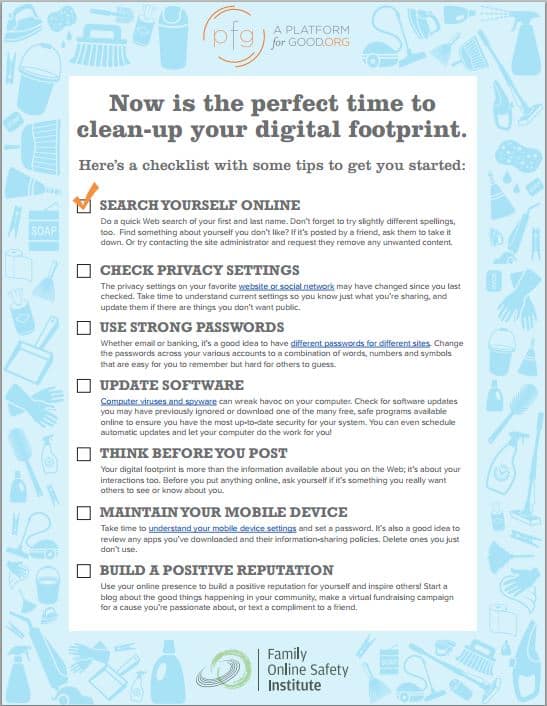The most popular footprint to clean up nowadays, besides the dirt one in your foyer, is your ecological one; between solar panels and organic foods, it’s a worldwide phenomenon that just won’t quit.
But even more relevant for today’s technology-crazed society is your digital footprint, and what exactly it says about you. If you’ve ever Googled yourself and thought you’d like to erase everything that’s on the first page, it’s time to get started on a little digital spring cleaning.
Your digital footprint, in easy terms, is just the trail of personal data you’ve left around the internet. From passwords to Facebook posts, it all leaves a “footprint” that can be traced back to your name, and whether you mean to or not, it can compile a lot of information about you that helps search engines and social networks sell ad space specifically designed for you. Everything from when you first signed into your AOL account to when you launched your MySpace page makes up your digital identity, and if you want to control what’s out there, you can.
1. Run A Name Search
Cleaning up your digital footprint is, in many ways, really easy. Starting with a name search, and taking into consideration a couple of different spelling, including your middle or maiden name, and adding relevant keywords, can result in pages and pages of your personal data. If you get onto Google and find things that you don’t like, figure out who posted it and go straight to the source. That may be a friend on Facebook on tagged you in a picture you’d rather not have up, or a site administrator published your comment without your consent. Ask to have it taken down first, and if it doesn’t work, check out the security settings for the platform you’re on—if there’s something you can do about it, you should.
2. Read The Security Agreements
Tightening up all your security settings is another way to limit what information gets out and cleans up your digital footprint. Security policies for sharing websites like Twitter, iTunes and Instagram are constantly changing, so update your understanding of what these companies are allowed to do by reading the new changes. If you don’t like what is out there, just create new settings to tighten up.
3. Change Your Passwords
Diversifying your passwords, whether it be for online shopping or online banking, is another great way to keep your information private. Don’t be one of those people who has three passwords they rotate around; it’s a great way to get hacked. Instead, pick something you’ll remember and vary the symbols, capitalization and numbers you add.
4. Install Spyware
Like privacy settings on Facebook, the anti-spyware settings or programs on your computer also need to be constantly monitored to make sure you’re not letting information leak out unknowingly. Download the latest versions, and any updates your computer prompts you to—it’s definitely in your best interest. Don’t have the time to constantly check for changes? Schedule your computer to make these changes weekly or monthly and have your technology work for you. You can also apply this to your phone and tablet, so you’re not sharing your location, or your Paypal account number, unknowingly.
5. Post With Purpose
And last but not least, be conscious of how you’re posting on the Internet because this has a big effect on your digital footprint. When it comes to having a good, positive reputation online it’s just like the playground politics you remember from grade school; “if you don’t have anything good to say, don’t say it” is a great rule of thumb now as it ever was. Instead of leaving a negative comment, just pass it by, and leave someone a nice text, or a “like”—not only will it make you feel better, it will make you look good too.
You digital footprint is just as simple as a real one—everything you’ve ever posted online is still there, and if you don’t want anyone to find it, you just clean it up, like dirt crumbs from your shoes, and leave a clean slate. Compiling all the things you can do: from asking that things you don’t like be removed to being nicer with your posts online, means you’ve got a tighter hold on what information about you gets shared with the masses, and remains online for anyone with internet access to see.
Getting started with the clean-up is easy, and maintaining it even more, with some computers and websites automatically doing it for you. If you want to clean your digital footprint, start by searching for yourself online; it just get’s easier from there.



Where is the checklist that is listed in Pinterest for this guide?
Clean my foot print
Thanks